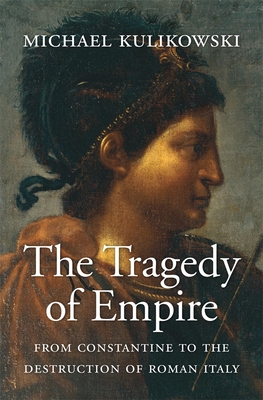

 Belknap Press
Belknap Press
The Tragedy of Empire: From Constantine to the Destruction of Roman Italy


Key Metrics
- Michael Kulikowski
- Belknap Press
- Hardcover
- 9780674660137
- 9.4 X 6.2 X 1.5 inches
- 1.85 pounds
- History > Ancient - Rome
- English
 Secure Transaction
Secure TransactionBook Description
A sweeping political history of the turbulent two centuries that led to the demise of the Roman Empire.
The Tragedy of Empire begins in the late fourth century with the reign of Julian, the last non-Christian Roman emperor, and takes readers to the final years of the Western Roman Empire at the end of the sixth century. One hundred years before Julian's rule, Emperor Diocletian had resolved that an empire stretching from the Atlantic to the Euphrates, and from the Rhine and Tyne to the Sahara, could not effectively be governed by one man. He had devised a system of governance, called the tetrarchy by modern scholars, to respond to the vastness of the empire, its new rivals, and the changing face of its citizenry. Powerful enemies like the barbarian coalitions of the Franks and the Alamanni threatened the imperial frontiers. The new Sasanian dynasty had come into power in Persia. This was the political climate of the Roman world that Julian inherited.
Kulikowski traces two hundred years of Roman history during which the Western Empire ceased to exist while the Eastern Empire remained politically strong and culturally vibrant. The changing structure of imperial rule, the rise of new elites, foreign invasions, the erosion of Roman and Greek religions, and the establishment of Christianity as the state religion mark these last two centuries of the Empire.
Author Bio
I am a late Roman historian and work on the political and institutional history of the empire between the second and fifth centuries, with a special interest in how one can read historical sources against the background of other evidence.
My first book was a study of Roman and post-Roman Spain that tried to set the small body of written texts against the background of material culture; my second looked at the impact of Roman imperialism on neighboring territories and argued that the history of the barbarians, specifically the Goths, can be understood entirely as a response to Roman imperialism.
I am presently at work on four projects: a history of the Roman empire from Hadrian to the fall of the western empire for the Profile History of the Ancient World; a study of late imperial political culture and the gap between political rhetoric and political practice called The Rhetoric of Being Roman; a history of the Latin chronicle tradition from its beginnings to the fifth century AD, in four volumes and in collaboration with R.W. Burgess; and as editor-in-chief of the forthcoming Landmark Ammianus Marcellinus.
Before coming to Penn State in 2009, I taught for eight years at the University of Tennessee.
Education
- PhD, University of Toronto, 1998
MA, University of Toronto, 1992
BA, Rutgers University, 1991
Source: PennState College of Liberal Arts
Videos
No Videos
Community reviews
Write a ReviewNo Community reviews